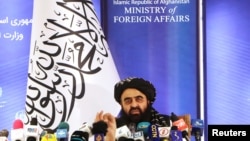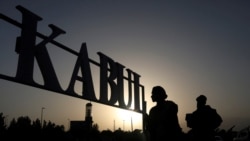Those watching the Taliban establish a government and assert control over Afghanistan are growing ever more wary of pledges by the group's leaders to make sure no terrorist organization can ever again use the country as a base for attacks against the United States.
The Taliban's counterterrorism commitment was a key part of the 2020 Doha Agreement that paved the way for the U.S. exit and eventual military evacuation from Afghanistan. Yet despite some praise for the businesslike way the Taliban cooperated with Washington's withdrawal, there have been few signs of any real action.
"Now is the time for the Taliban to show their commitment to not allow Afghan soil to be used by ISIS-K or any other terrorist group that threatens the security of the United States or its allies, and certainly not innocent Afghans for that matter," a State Department spokesperson told VOA on the condition of anonymity in order to discuss the sensitive subject.
"We are closely watching the Taliban's actions across the country," the spokesperson added. "We'll hold them accountable."
Top U.S. military and intelligence officials have been even more blunt.
"I don't know that they're doing anything at all for us right now," General Kenneth "Frank" McKenzie, commander of U.S. Central Command, said Friday when pressed by VOA on whether the Taliban were making good on their counterterrorism promise.
Threat to US
The director of the National Counterterrorism Center (NCTC) told lawmakers Tuesday that with the Taliban now in control of Afghanistan, terror groups like al-Qaida, long intertwined with the Taliban, and the Islamic State's Afghan affiliate, known as IS-Khorasan or ISIS-K, could try to target the U.S. homeland in as little as a year.
"We've got to monitor and assess whether that's going to happen faster," Christine Abizaid said.
Taliban leaders have repeatedly pushed back against accusations that they will allow groups like al-Qaida and IS-Khorasan to flourish.
Taliban denial
On Tuesday, Taliban spokesperson Zabihullah Mujahid went even further, denying that either of the groups had a foothold in the country.
"We do not see anyone in Afghanistan who has anything to do with al-Qaida," Mujahid told a news conference in Kabul.
"The ISIS that exists in Iraq and Syria does not exist here," he added. "We are committed to the fact that, from Afghanistan, there will not be any danger to any country."
U.S. and international intelligence officials, however, say the evidence shows otherwise.
According to a United Nations assessment from June, al-Qaida, and its affiliate, al-Qaida in the Indian Subcontinent (AQIS), have as many as 500 members in Afghanistan. AQIS, it said, "operates under the Taliban umbrella from Kandahar, Helmand (notably Baramcha) and Nimruz provinces."
Rise in terror fighters
More recent U.S. assessments concluded that since the Taliban takeover, there are at least "2,000 hardcore ISIS fighters" roaming in the country. Previous U.N. assessments indicated the number might be even higher.
In written testimony submitted to Congress on Tuesday, the NCTC's Abizaid further warned that IS-Khorasan "maintains a steady operational tempo in Afghanistan and retains the ability to execute attacks in cities like Kabul."
And both IS-Khorasan and al-Qaida could soon see their numbers start to grow.
"We are already beginning to see some of the indications of some potential movement of al-Qaida to Afghanistan," Central Intelligence Agency Deputy Director David Cohen said last week during an intelligence and security conference just outside of Washington.
Western counterterrorism officials and aid workers on the ground in the region have further warned that both al-Qaida and IS-Khorasan have been laying the groundwork for a sure but steady expansion once U.S. troops finally left the country.
Furthermore, despite a string of recent attacks against the Taliban across Afghanistan claimed by IS-Khorasan, officials and analysts say they have seen few signs of a serious or concerted crackdown by Taliban forces since they took power.
Moves like giving a leading role to Sirajuddin Haqqani, a senior leader of the Haqqani Network which has maintained close ties to both al-Qaida and IS-Khorasan, have also gotten their attention.
"[It] certainly concerns me," Federal Bureau of Investigation Director Christopher Wray said Tuesday at a Senate hearing on threats to the U.S. homeland, calling the Taliban itself a "terrorist organization."
"We are concerned about what the future holds, whether it's the possibility of another safe haven, whether it's the possibility of ISIS-K being able to operate more freely in a less secure environment," Wray added.
Still, there are some who see hope that the Taliban will keep both al-Qaida and IS-Khorasan in check.
"They know that the last time they harbored al-Qaida and it engaged in an outwardly directed attack, an attack on our homeland, certain things followed, which I believe the Taliban would have an interest in not seeing repeated," the State Department spokesperson told VOA. "So, whatever their views on al-Qaida, there is a strong disincentive built in to allow it to engage in outwardly directed attacks."
Natural enemies
The Taliban's long-standing ties with al-Qaida also make it a natural enemy of IS-Khorasan.
As recently as March of last year, U.S. officials credited the Taliban with helping oust IS-Khorasan from its Afghan strongholds.
But some more recent intelligence assessments, not from the U.S., reported the Taliban had been using IS-Khorasan, through the Haqqani Network, to attack the now defunct U.S.-backed Afghan government.
And even if the Taliban want to crack down on IS-Khorasan cells, they may not have the right capabilities.
"I don't think what we'll see from the Taliban will be traditional [counterterrorism], as we think of it," Colin Clarke, director of policy and research at the global intelligence firm The Soufan Group, told VOA.
"It's much easier to play a spoiler role than to perform effectively in the role of counterinsurgent," he said. "I think the Taliban could be effective in clearing an area, but it will struggle more with holding it."
"At the end of the day, it's insurgent fratricide, and we'll see guerrilla-on-guerrilla engagements between the Taliban and ISIS-K … assassinations, hit-and-run attacks, the use of IEDs, and other classic insurgent tactics."
Ayaz Gul in Islamabad contributed to this report.








